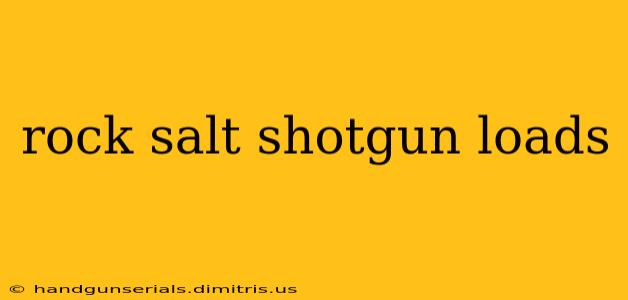Rock salt shotgun loads have a long history, used for everything from pest control to self-defense. However, their effectiveness, legality, and safety are complex issues demanding careful consideration. This article will explore these facets in detail, providing a comprehensive overview for anyone considering using rock salt ammunition.
Effectiveness of Rock Salt Shotgun Loads
The effectiveness of rock salt shotgun loads is highly dependent on several factors:
-
Range: Rock salt's effectiveness drastically decreases with distance. At close range (under 10 yards), it can be lethal to small animals and potentially cause serious injury to humans. Beyond 20 yards, its effectiveness drops significantly, making it unreliable for self-defense or hunting larger game. The inconsistent size and shape of the salt crystals further contribute to poor accuracy and inconsistent patterns at longer ranges.
-
Target: Rock salt's impact is primarily blunt force trauma. While effective against smaller animals like rodents and nuisance birds, it's less effective against larger, tougher animals with thicker hides or fur. Its lack of penetration makes it unsuitable for hunting game animals.
-
Gauge and Choke: The gauge of the shotgun and the choke used significantly impact the pattern and spread of the rock salt. A tighter choke will create a narrower pattern, increasing the concentration of pellets at the point of impact but reducing the overall area covered. A wider choke will have the opposite effect.
Legal Considerations for Using Rock Salt Shotgun Loads
The legality of using rock salt shotgun loads varies considerably depending on location. Many jurisdictions have specific regulations regarding the use of non-lethal ammunition, particularly for self-defense.
-
Self-Defense: While rock salt might be considered a less-lethal option, its potential to cause serious injury makes its use in self-defense a legal gray area. The use of any firearm, including shotguns loaded with rock salt, in self-defense is subject to the laws of your state and the specific circumstances surrounding the incident. It's crucial to understand the legal ramifications before using it in this capacity.
-
Pest Control: Even for pest control, some jurisdictions may regulate the use of rock salt, particularly in populated areas or near protected wildlife. Always check local and state regulations before using rock salt for pest control.
-
Hunting: Rock salt is generally not legal for hunting game animals in most places. Hunting regulations typically specify legal ammunition, and rock salt rarely meets these requirements due to its low penetration power and inconsistent impact.
Safety Precautions When Using Rock Salt Shotgun Loads
Safety is paramount when handling any firearm, and rock salt loads are no exception. Improper use can lead to serious injury or property damage.
-
Eye and Ear Protection: Always wear eye and ear protection when firing a shotgun, regardless of the ammunition used. Rock salt can cause significant eye injury.
-
Safe Backstop: Ensure a safe backstop is in place to prevent ricochets and stray pellets from causing harm. Hard surfaces should be avoided.
-
Proper Handling: Follow all safe firearm handling procedures. Keep the shotgun unloaded until ready to fire, and always treat the firearm as if it were loaded.
-
Understanding Limitations: Recognize the limitations of rock salt. Its relatively short effective range and lack of penetrating power mean it's not suitable for all situations.
Disclaimer: This information is for educational purposes only and should not be considered legal or professional advice. Always consult with local authorities and relevant experts regarding the legal and safe use of firearms and ammunition in your specific location. The author and publisher are not responsible for any injury, damage, or legal consequences resulting from the use of rock salt shotgun loads.

